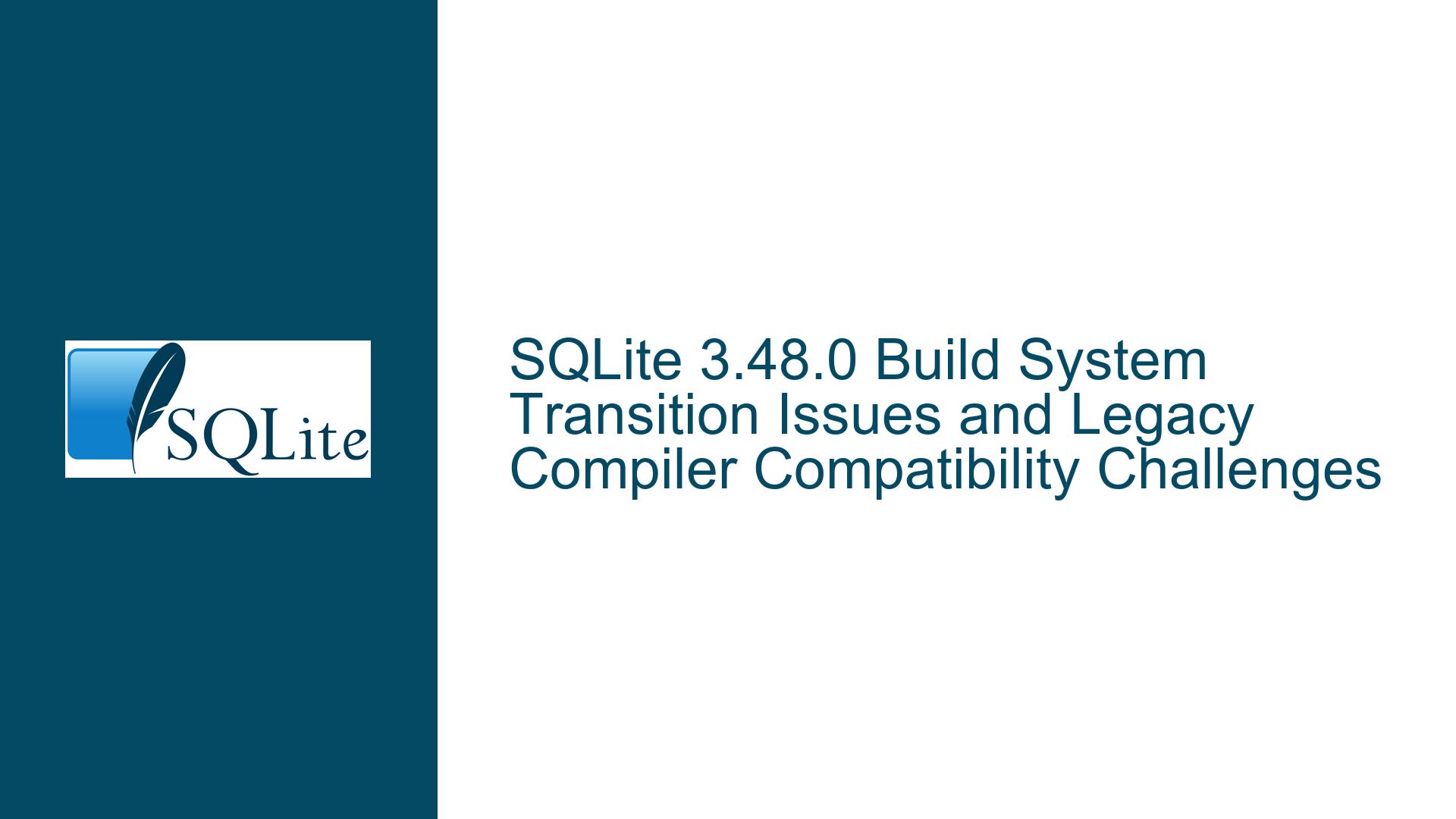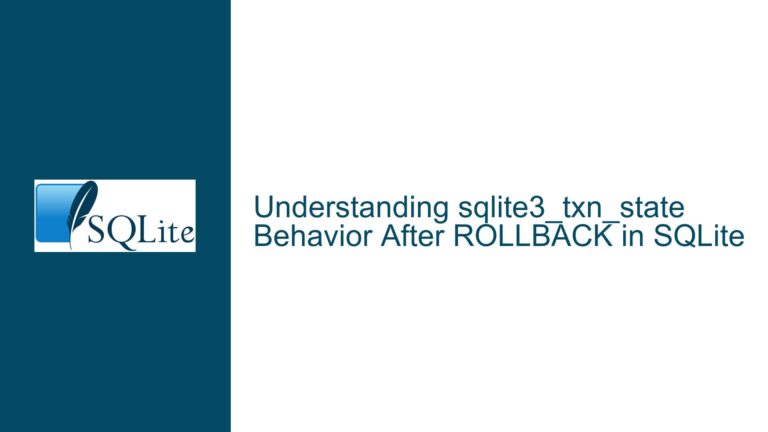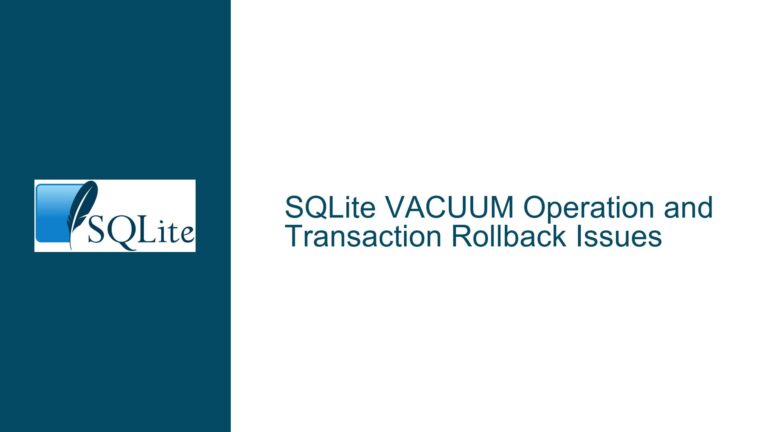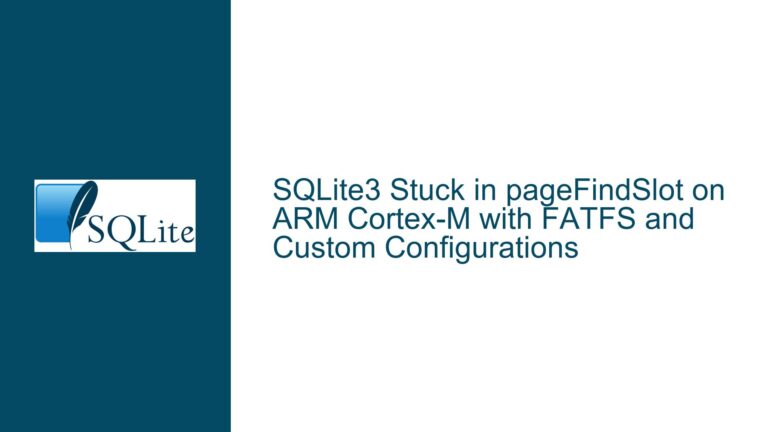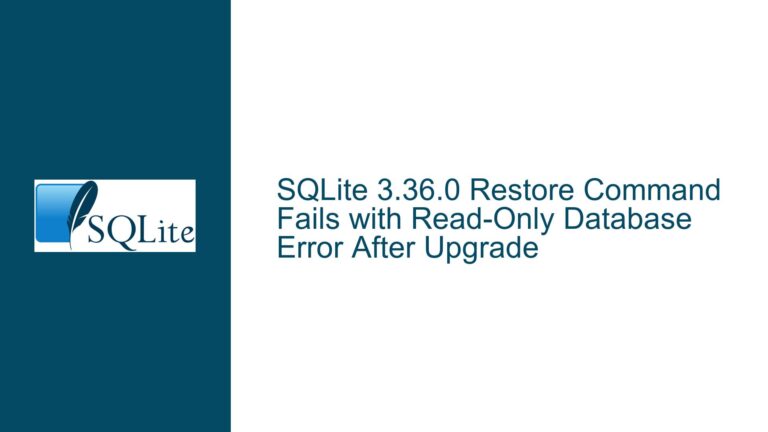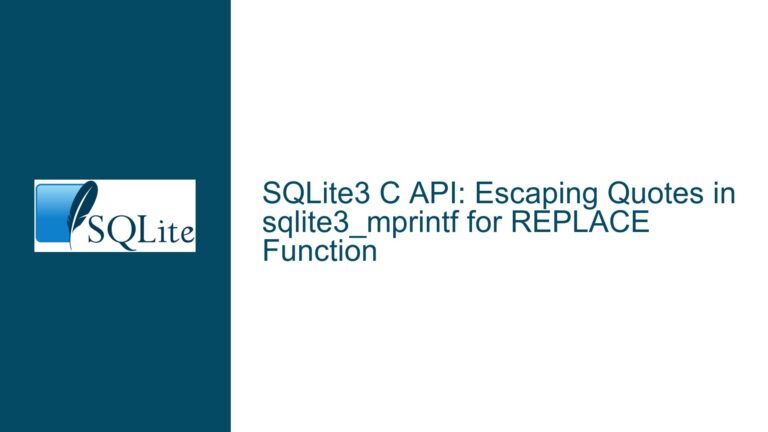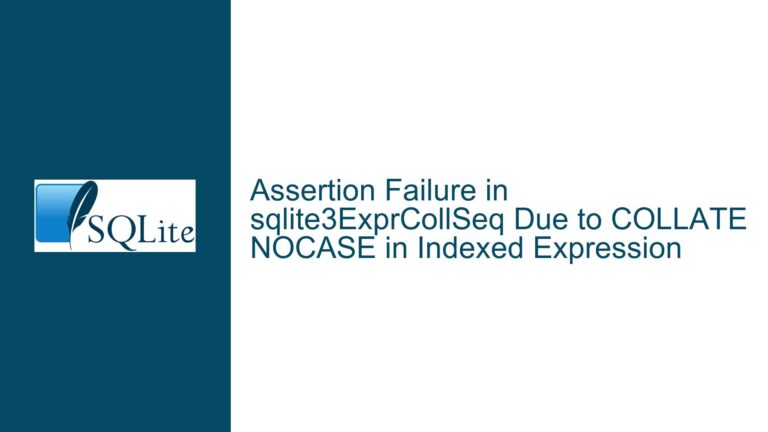SQLite 3.48.0 Build System Transition Issues and Legacy Compiler Compatibility Challenges
Build Configuration Shifts, Compilation Failures, and Release Artifact Inconsistencies
The impending release of SQLite 3.48.0 introduces significant changes to the build infrastructure that have exposed several critical issues affecting different categories of users. At the core lies the migration from GNU Autoconf to Autosetup for configuration management, a transition that interacts unexpectedly with legacy build environments and deployment workflows. Secondary challenges emerge from compiler compatibility thresholds, particularly with older Microsoft Visual Studio versions, while tertiary issues involve documentation gaps and release packaging inconsistencies.
Three primary pain points dominate user reports:
- Unexpected build toolchain requirements for host system utilities (lemon, mkkeywordhash, jimsh)
- Cross-compilation environment conflicts between host/target toolchains
- Version compatibility cliffs with pre-2015 Microsoft C compilers
The technical landscape reveals deeper architectural shifts:
- Replacement of TCL dependency with embedded JimTcl interpreter in build tools
- Divergence between source tree configuration (Autosetup) vs. release tarballs (legacy Autoconf)
- New C99 requirement for build infrastructure components
These changes create four distinct failure modes:
- Host tool compilation failures due to C99 syntax in jimsh0.c
- Environment variable propagation gaps in Makefile.msc
- HAVE_ macro detection discrepancies between Autoconf/Autosetup
- Release artifact structure changes breaking existing integration pipelines
Autosetup Adoption Complexities and Historical Compiler Limitations
The root causes of these issues stem from fundamental changes in SQLite’s build architecture and decades-spanning compiler compatibility requirements:
1. Autosetup vs. Autoconf Feature Parity Gaps
The Autosetup configuration system (while offering advantages in maintainability) currently lacks complete behavioral parity with the legacy Autoconf implementation. Key differences include:
- Alternative macro detection logic for system capabilities (fdatasync, usleep, etc.)
- Different compiler flag propagation mechanisms
- Distinct host/target environment separation strategies
This creates subtle differences in generated sqlite3.c amalgamation content when comparing Autoconf vs. Autosetup-built versions, particularly in the realm of platform feature detection.
2. JimTCL Runtime Requirements
The new jimsh0.c component (part of the Autosetup infrastructure) imposes C99 language requirements that break compilation on pre-VS2015 Microsoft compilers. Specific failure points include:
- Mixed declarations and code (C89 prohibition)
- Use of modern standard library defines (ETIMEDOUT)
- Structure initialization syntax
- _snprintf dependency without legacy fallbacks
3. Build Host vs. Target Toolchain Entanglement
The Makefile.msc logic makes assumptions about host tool compilation that fail in mixed-bitness environments:
- Hardcoded ‘cc’ references for lemon/jimsh compilation
- Lack of BUILD_CC/BUILD_CFLAGS propagation
- Implicit host architecture assumptions for build tools
4. Release Packaging Transition Artifacts
The simultaneous maintenance of legacy Autoconf tarballs alongside Autosetup-enabled source trees creates documentation confusion and version skew risks:
- sqlite-autoconf-*.tar.gz retaining old build system
- sqlite-src-*.zip containing Autosetup configuration
- Missing explicit deprecation timeline for Autoconf
5. Microsoft C Runtime Evolution
Visual Studio’s incremental C standards support creates version-specific failures:
- VS2008: Lacks C99 mixed declarations
- VS2013: Missing _snprintf export in CRT
- Pre-VS2015: Incomplete C11 atomic support
Build System Adaptation Strategies and Legacy Environment Mitigations
Resolving Host Toolchain Configuration Issues
Problem: Build tools (lemon, mkkeywordhash) fail to compile due to CC/CFLAGS not being honored
Solution: Explicitly specify host compilation environment
export CC_FOR_BUILD="i686-linux-gnu-gcc"
export BUILD_CFLAGS="-m32 -O2"
./configure --host=x86_64-w64-mingw32 --build=i686-linux-gnu
Verification: Check generated config.log for host tool compilation commands
grep 'Host compiler' config.log
# Should show CC_FOR_BUILD being used for lemon/jimsh
Fallback Strategy: Precompile build tools on modern host
# In Makefile.msc
LEMON = prebuilt/lemon.exe
MKKEYWORDHASH = prebuilt/mkkeywordhash.exe
sqlite3.c: $(LEMON) $(MKKEYWORDHASH)
# Existing build rules
Addressing Legacy Visual Studio Compilation Failures
Problem: jimsh0.c compilation fails on VS2008-VS2013
Option 1: Enforce C89 compatibility in JimTCL code
--- jimsh0.c
+++ jimsh0.c
- int rc = Jim_SetResult(interp, Jim_NewStringObj(interp, buf, -1));
+ Jim_Obj *result;
+ int rc;
char buf[64];
sprintf(buf, "%" PRId64, value);
+ result = Jim_NewStringObj(interp, buf, -1);
+ rc = Jim_SetResult(interp, result);
Option 2: Utilize TCL 8.6+ as build dependency
# In Visual Studio Command Prompt
set PATH=C:\Tcl\bin;%PATH%
nmake /f Makefile.msc USE_TCL=1
Option 3: Modern Compiler Shimming
# Use clang-cl as CC_FOR_BUILD wrapper
export CC_FOR_BUILD="clang-cl --target=i386-pc-windows-msvc18"
export BUILD_CFLAGS="-D_snprintf=snprintf"
Harmonizing Autoconf and Autosetup HAVE_ Macros
Problem: Discrepancies in platform capability detection
Audit Process:
# Generate Autoconf config.h
./configure && grep HAVE_ config.h > autoconf_haves.txt
# Generate Autosetup config.h
./configure.autosetup && grep HAVE_ config.h > autosetup_haves.txt
diff autoconf_haves.txt autosetup_haves.txt
Manual Override File:
# create custom_config.h
#define HAVE_FDATASYNC 1
#define HAVE_USLEEP 1
# Configure with overrides
./configure.autosetup --extra-cflags=-includecustom_config.h
Release Artifact Structure Management
Problem: Amalgamation ZIP layout changes break include paths
Build System Patching:
# In project Makefile
SQLITE_DIR := $(shell unpack_sqlite.sh sqlite-amalgamation-3480000.zip)
CFLAGS += -I$(SQLITE_DIR)/include
Unpacking Wrapper Script:
#!/bin/bash
# unpack_sqlite.sh
mkdir -p sqlite-amalgamation
unzip -j "$1" -d sqlite-amalgamation
echo $(pwd)/sqlite-amalgamation
Cross-Compilation Environment Validation
Problem: Host tools built for wrong architecture
Diagnostic Checklist:
- Verify build tools ELF headers
file lemon mkkeywordhash # Should match build machine arch - Check config.site for host/target mixups
- Validate HAVE_ macros against target platform
grep -r 'SQLITE_OS_.* 1' config.h - Test compiled tools on host
./lemon -h # Should return 0 exit code
Documentation and Release Note Clarifications
Problem: Missing build requirement notices
Supplemental Documentation:
## SQLite 3.48.0 Build Requirements
| Component | Minimum Version | Notes |
|-----------------|------------------|--------------------------------|
| Microsoft Visual Studio | 2015 (14.0) | Required for jimsh0.c compilation |
| TCL (optional) | 8.6 | Alternative to builtin JimTCL |
| Autosetup | 0.6.1 | Bundled in source tree |
| C Runtime | ISO C99 | For host tools compilation |
Continuous Integration Pipeline Adjustments
Sample Azure Pipeline Configuration:
jobs:
- job: LegacyWindows
pool:
vmImage: 'windows-2019'
steps:
- task: MSBuild@1
inputs:
solution: sqlite3.sln
platform: 'Win32'
configuration: 'Release'
msbuildArguments: '/p:PlatformToolset=v140 /p:WindowsTargetPlatformVersion=8.1'
- job: ModernLinux
pool:
vmImage: 'ubuntu-22.04'
steps:
- script: |
export CC_FOR_BUILD=gcc
./configure --host=aarch64-linux-gnu
make sqlite3.c
displayName: 'Cross-compile amalgamation'
Preprocessed Distribution Recovery Process
Problem: Missing sqlite-preprocessed-*.zip
Recreation Procedure:
# From source tree
make clean
export CPPFLAGS="-DSQLITE_ENABLE_PREPROCESSED_DIST=1"
./configure.autosetup
make
zip -r sqlite-preprocessed-3480000.zip sqlite3.c shell.c
Long-Term Maintenance Strategy Formulation
Roadmap Proposal:
- Q1 2025: Maintain parallel Autoconf/Autosetup release artifacts
- Q2 2025: Deprecate Autoconf in documentation
- Q3 2025: Provide migration tool for HAVE_ macro conversion
- Q4 2025: Remove Autoconf from release packaging
- Q1 2026: Enforce C11 standard for host tools
Version Compatibility Matrix:
| SQLite Version | Autoconf Support | Min VS Version | TCL Alternative |
|----------------|------------------|----------------|-----------------|
| 3.48.x | Yes (legacy) | 2015 | 8.6+ |
| 3.49.x | Warning | 2017 | 9.0+ |
| 3.50.x | Removed | 2019 | Required |
Performance Optimization for Legacy Environments
Problem: Build time inflation on older systems
Incremental Build Techniques:
# Makefile.msc partial rebuild rules
sqlite3.c: parse.h
touch $@
parse.h: parse.y lemon.exe
lemon.exe -S $<
lemon.exe: lemon.c
$(CC_FOR_BUILD) $(BUILD_CFLAGS) -o $@ $^
Precompiled Header Strategy:
// sqlite_pch.h
#include <stdint.h>
#include <string.h>
#include "sqlite3.h"
// Compile with
cl -Fpsqlite.pch sqlite_pch.h
cl -Yu"sqlite_pch.h" sqlite3.c
Community Feedback Integration Process
Issue Triage Workflow:
- Reproducibility Assessment: Verify failure across multiple environments
- Version Bisecting: Identify exact commit introducing regression
- Impact Analysis: Classify as build/system/runtime issue
- Mitigation Development: Short-term workaround creation
- Upstream Coordination: Patch submission to Autosetup/jimtcl
Example Bisection Procedure:
git bisect start v3.47.0 v3.48.0
git bisect run ./build-test.sh
# build-test.sh
#!/bin/bash
make clean && make || exit 125
./test-suite | grep "Expected behavior"
This comprehensive approach addresses the multidimensional challenges presented by SQLite’s build system modernization while maintaining support for legacy environments through explicit configuration pathways and architectural awareness. The solutions balance immediate problem mitigation with long-term sustainability planning, ensuring organizations can transition at their own pace while maintaining compatibility with existing infrastructure.
